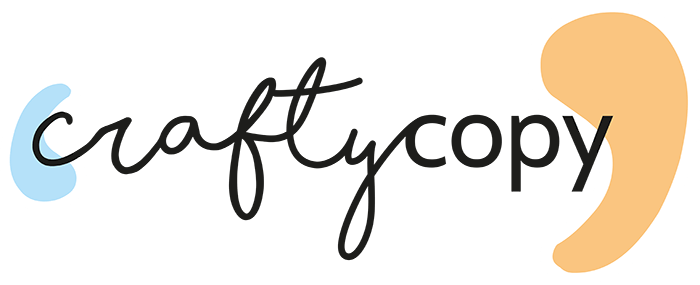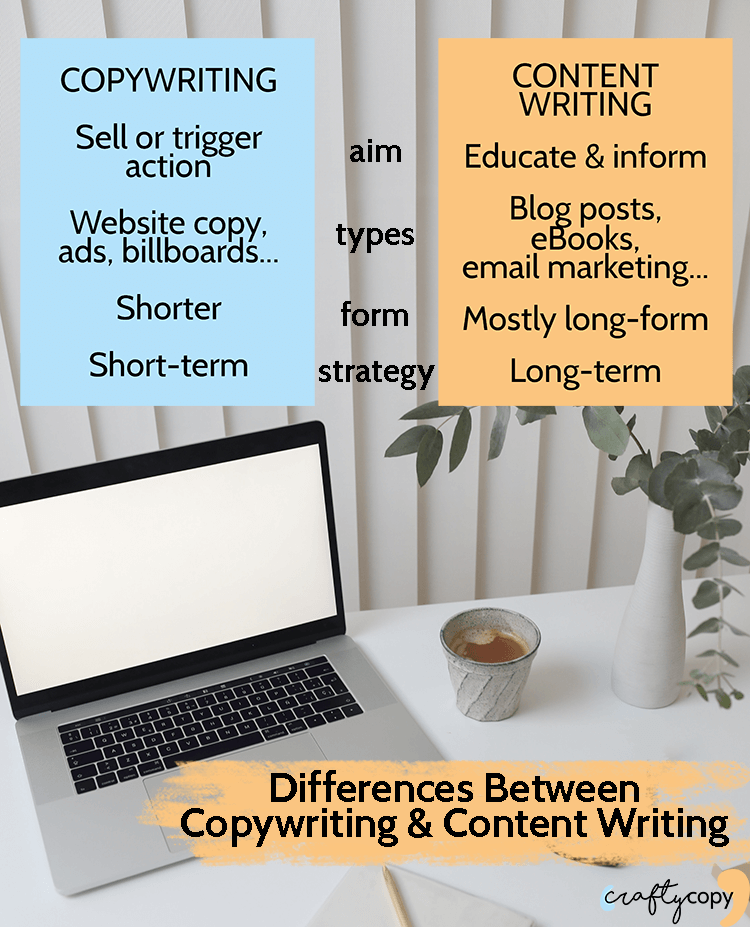The ACTUAL Difference Between Copywriting & Content Writing
“Wait, there’s an actual difference between copywriting and content writing?”
“Aren’t they just two pretentious ways of saying the same thing?”
Well, not really.
Actually, scrap that: I was just trying to be nice. I meant ‘not at all!’
While copywriting and content writing both involve writing words in a marketing context, they have different aims, strategies, and even average lengths.
Let me make the difference between content and copywriting clearer for you. That way, you’ll know exactly in which one you should invest depending on your needs and goals.
Overview of copywriting and content writing in marketing
To understand the difference between copywriting and content marketing, let’s look at the two strategies individually first.
What exactly does a copywriter do?
A copywriter creates compelling copy to sell products and services or to persuade their readers to follow through with a specific call to action, either online or in print.
A copywriter’s superpower is to grab someone’s attention immediately, show them how a product or action can improve their life or solve their problems, and convince them to buy it or take action.
The reason why a copywriter must be impeccable at hooking the reader in so quickly is that our average attention span seems to be around 8 seconds, which is even shorter than a goldfish.
No time to waste on fancy jargon or long introductions!
This is most definitely NOT an extensive list, but, to give you an idea, here are some copywriting examples:
Landing or sales pages
Paid ads
Billboards
Product descriptions
Brochures
Promotional email campaigns
Print letters and leaflets
Promotional social media posts
You see what they have in common, right? They’re all conversion-focused types of copy.
Whether it’s a landing page or a physical brochure, they’re pretty much doomed if they fail to capture someone’s attention with the very first lines, and they’re there to convince the reader to perform a specific action afterwards.
In most cases, this will be buying the actual product or service, but it could also involve subscribing to a newsletter or registering for a webinar, for example.
What does a content writer do?
A content writer (or content marketer) creates engaging content to inform, entertain, and educate a specific audience on relevant industry-related topics.
They don’t focus on hard promotions nor do they immediately tell you to buy a product. Instead, they play the long-term game. Why?
To build a loyal audience by reaching more and more of their target customers and, most importantly, retaining them.
That’s a content writer’s superpower: entertaining an audience and giving them actionable insights and tips on topics they love so that they stick around, become your most loyal fans, and, ultimately, buy from you.
As for types of content writing, you can have:
Email marketing
Articles
eBooks
Social media posts
White papers
Blog posts are one of the most popular, and they’re often used as an actual synonym of content marketing.
Some of these articles answer questions that are common within a company’s target audience and show them how to solve that annoying problem that’s been plaguing them for a while.
Some others help them understand more about specific industry-related topics that they’re already interested in.
By providing so much value, a content writer ultimately helps generate more sales, too. They reach people who already care about your industry but haven’t heard of you before, bring them onto your website, inform them, build trust, and earn their loyalty.
However, selling is NOT the main aim of their content. Informing and entertaining are.
6 differences between copywriting and content writing
Now that you have a better understanding of these two individual strategies, let’s have a closer look at the actual differences between copywriting and content writing.
1. Copywriting sells or converts. Content writing informs
The most important difference between content writing and copywriting is their main aim.
Copywriting is meant to trigger a specific action, which may or may not be a purchase.
For example:
An ad convincing your audience to book a table at your restaurant
A landing page prompting them to leave their email address in exchange for a free eBook
A product description compelling them to buy a product right now
Content writing, on the other hand, is more humble and generous: it’s not there to generate sales but rather to offer actual value to your audience.
This could involve:
A blog post answering one of your prospects’ questions on your specific industry
An eBook offering them an in-depth overview of that subject
A newsletter with tips and advice to help ambitious female entrepreneurs become THE go-to solution in their dream audience’s eyes (whoops, that’s mine)
2. Copywriting is about convincing your audience to perform an action right now [short-term strategy]…
Of course, this isn’t to say that every single person who reads your landing page or paid ad is going to click ‘buy now’.
Overall, however, the aim of copywriting is to convince as many people as possible to do that.
And not just anytime: right freakin’ now.
That’s why the best copy triggers an emotional reaction in its readers and relies on techniques like:
FOMO
Scarcity
Reminding them what their situation is gonna keep on looking and feeling like if they don’t take action immediately
3. Content writing smoothens the funnel in a slow and steady way [long-term strategy]
Let me say it louder for the people in the back:
You should never invest in content writing to make more sales right now. In fact, the right content writing mindset isn’t about selling at all!
It’s about building trust, growing and retaining your audience, helping your website rank higher in the process, and establishing yourself as the most logical solution in your target customers’ eyes when they’re finally ready to part with their money.
That’s why another big difference between copywriting and content writing is that the former is a short-term strategy, whereas the latter is about the long-term game.
4. Copywriting tends to be in a shorter form than content writing
In most cases, copywriting is shorter and snappier because, as you now know, it focuses on grabbing your audience’s attention and convincing them to follow through with a call to action.
Think of catchy slogans and ads or a 500-word website home page.
With content writing’s aim being to inform and educate your audience, it’s no wonder that it tends to be much longer.
Obviously, this really depends on the subject, but, to give you an idea, the average blog post is 1142 words long, and most of them range between 500 and 1500. However, you can find articles with a word count above 2000, too.
There are exceptions, of course, with the most obvious one being sales pages.
If you’re writing one to convince your target customers to invest in your £10,000 premium offer, you’ll need to rely on compelling sections that agitate their current pain point, address their top concerns and excuses, and paint a picture of how much better their life or business will feel once they’ve invested in you.
It’ll need to include data, a good overview of what’s included, testimonials, and more social proof.
Basically, it’ll be much longer than a 500-word blog post tackling a small sub-topic.
5. SEO is relevant for both copywriting and content writing but differently
When it comes to online copywriting and content marketing in the form of blog posts, SEO plays a HUGE role.
Let’s take your business website as an example as that’s the most relevant one when it comes to search engine optimisation:
Your website copy (copywriting) will convince its readers to purchase your products, leave your their email address, or book a strategy call, but SEO is what helps them find your website in the first place. By targeting the right keywords, you’ll attract bottom-of-the-funnel prospects who’re pretty much ready to buy the type of product or service that you sell but haven’t decided who they’re gonna purchase it from yet
Your blog posts (content writing) should be based around long-tail SEO keywords typed by your target audience to find out more about your specific industry. In most cases, these will be top- or middle-of-the-funnel prospects who have questions about it. You need to find the most popular way in which they type them (=the right keywords), answer their questions, and encourage them to stick around, perhaps by subscribing to your newsletter where you share similar tips
6. Content writing generates more relevant traffic, and copywriting converts it into leads and sales
Forgive me for using this terrible buzzword, but these strategies should work in ✨synergy✨.
The very differences between copywriting and content writing allow the latter to actively complement the former.
Your blog posts and content writing pieces help you generate more targeted traffic
Your website copy will then convince a good portion of it to leave you their email address (=becoming a lead) or to invest in your products or services
So, what is the difference between content and copy?
Overall, the difference between content and copy is that content tends to be longer and written to inform and educate an audience, whereas copy is shorter and focused on conversions, whether that’s turning readers into leads or buyers.
I’ve definitely seen content and copy being used interchangeably before (even by some fellow writers, UGH!).
“ThEy BoTh InVoLvE wOrDs & MaRkEtInG!!1!!”
But it would be like saying that proofreading = editing, or that jazz is the same as blues just because they both involve music and a saxophone.
So, keep it in mind. If you don’t know the difference between copywriting and content writing, you can run the risk of investing in the wrong service.
Can a content writer be a copywriter?
Yes, a content writer can be a copywriter (and vice versa), but it’s not a given! It really depends on someone’s background, training, and what they specialise in.
Some writers only write copy, some others content. Some writers specialise in certain types of content or copy, and some others have got the right skills and experience to excel at both.
For example, because I specialise in website copywriting and blog writing services, I can wear both my copywriter and content writer hats.
Never at the same time, though! I’d look stupid.
Just don’t make the mistake of assuming that someone who specialises in, say, sales pages can automatically create a blogging strategy that will smoothen the funnel and help you grow your audience.
Copywriting vs content marketing: as a badass female-founded brand, which one do you need?
Well… both!
Now that you know the difference between copywriting and content writing, it shouldn’t come as a surprise that you must invest in some conversion-focused copy to generate more leads and sales.
If you’re looking to attract and grow your audience while building trust and smoothening the funnel, on the other hand, you need some content writing.
I can help with both!
My website copywriting services will help you attract your target audience and convert more visits into sales. Enough with boring, corporate-sounding pages! Let me speak to your dream audience and set you apart from your competitors
My blogging services will attract top-of-the-funnel leads, position you as a thought-leading expert in your field, and make it crystal clear that you’re the best possible solution when they’re finally ready to click that ‘buy now’ button
More #crafty blog posts on this topic:














